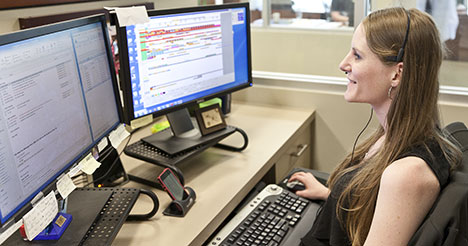

April 24, 2017
Schedulers and licensed dispatchers play an important role in any safety program and should be considered vital to the development of the safety culture, too.
“The tasks of a scheduler and licensed dispatcher can vary greatly during a typical work day, from the administrative to the safety-critical. Quite often, the first line of defense when a trip is in the planning stages, these non-flying aviation professionals must identify potential hazards and manage risk,” said Jo Damato, CAM, NBAA’s director of educational development and strategy, and liaison to the NBAA Schedulers & Dispatchers Committee.
“Experience – and now research – are proving how critical a role schedulers and licensed dispatchers can play in an organization’s safety culture,” added Damato.
Damato pointed to data presented at the recent NBAA Schedulers & Dispatchers Conference by Stephen Birch, a doctoral candidate at Pepperdine University who has researched the impact of positive safety culture in general aviation.
Untapped Potential
“Schedulers and dispatchers are often overlooked in the leadership of the safety management system (SMS),” said Birch. “I encourage properly qualified schedulers and dispatchers to be on their organization’s safety committee.”
Birch’s research indicates that only about 5 percent of Part 91 schedulers and dispatchers serve on their company’s safety committees. But he believes schedulers and dispatchers trained in safety management should participate in the safety committee, as they can have a significant impact on safety culture.
“To say that schedulers and dispatchers are integral to the safety of an organization is an understatement,” said Birch. “They are on the front lines. They have the opportunity to identify the first weak link in an accident chain.”
Birch pointed to the multitude of safety-related elements a scheduler or dispatcher manages daily, like crew duty and rest times, security checks, route planning and more. He also emphasized that these individuals are most likely to have regular, direct communication with the safety stakeholders involved, including clients/passengers, management, pilots and vendors.
“Schedulers and dispatchers have the ability to constantly monitor for deviations in the system,” said Birch, adding that these individuals often are more in tune with the concepts of an SMS than they might realize.
Birch believes that organizational trust is the key to developing the positive safety culture needed in any high-reliability organization. He emphasizes the importance of relationships, especially with pilots, since pilots are the most visible people in an aviation organization.
Relationships Enhance Safety
“Schedulers and licensed dispatchers have an opportunity to develop positive relationships with pilots, passengers and management, as well as outside vendors because their daily tasks involve communicating with all of these people,” said Damato. “These relationships, coupled with frequent communication, means schedulers and licensed dispatchers can share and advocate for the beliefs and values – including safety – of an organization. Upper management needs to understand the importance of schedulers and licensed dispatchers to a company’s safety culture and encourage their leadership.”


 International Business Aviation Council Ltd.
International Business Aviation Council Ltd.